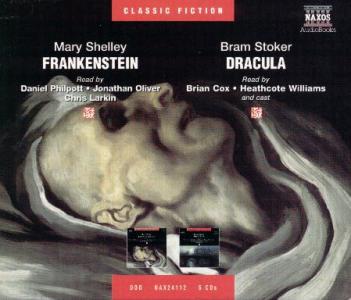Audio Book Review
Bram STOKER Dracula 3 CDs Audio Book
Mary SHELLEY Frankenstein 2 CDs Audio Book
NAXOS NA311512 [3hrs 56mins]
NAXOS NA200312 [2hrs 37mins]
Bram Stoker’s celebrated tale of the vampiric Count ‘Dracula’ has been filmed numerous times, but rarely has his story been faithfully represented (the excellent BBC television adaptation Count Dracula (1977) with Louis Jourdan in the title role came closest). Of course, that is not to suggest that other less scrupulous versions have lacked quality. Indeed, several have been outstanding; Hammer’s Dracula (AKA: The Horror of Dracula) (1958) with the wonderful partnership of Christopher Lee as the Count and Peter Cushing as his adversary, Van Helsing, is a marvellous production, while Francis Ford Coppola’s Bram Stoker’s Dracula (1992), though often deviating from the text, creates a stylish modern variation while retaining many of the novel’s most powerful elements. It’s also interesting to note that for many years actor Christopher Lee has lamented the fact that no one has produced a true interpretation of Stoker’s novel and so it seems very fitting that at last, if not on celluloid, here we have an audio production that remains faithful to the letter of the book (if in a slightly abridged version).
What impressed me most about this wonderful realisation of this timeless story, was that it had all of the distinction and attention to detail of one of BBC Radio Four’s estimable productions, with full cast, sound effects and well chosen background music (Philip Feeney’s ‘Dracula’, Vasily Kalinnikov’s ‘Epic Poem’ and Hans J. Salter and Paul Dessau score to House of Frankenstein (1944)). The vocal performances are accomplished too, led by the excellent Brian Cox as Van Helsing and Heathcote Williams giving a silkily menacing reading of the title character. Truthfully it’s difficult to find fault with this fine production. If terror, intrigue and drama are what you seek, then look no further.
While the character of Count Dracula stands as one of the most familiar names in the pantheon of horror or any other genre of literature, the equally recognisable name of Frankenstein must be one of most frequently misinterpreted. For many this moniker conjures a vision of a thuggish monstrosity, probably complete with bolts protruding from its neck. And yet, the truth is that Frankenstein is in fact the name of the man who created the monster, rather than the creature itself. As with ‘Dracula’, this story too has been often plundered by film-makers and just as loosely adapted. Fortunately there have still been several outstanding productions based on this seminal work, from James Whale’s enduring classic Frankenstein (1931) with Colin Clive in the title role and Boris Karloff as the monster, through to The Curse of Frankenstein (1957) with Cushing and Lee in the film that began Hammer’s vastly successful run of British horror movies that lasted right through until the early seventies. Probably best of all to my mind, although again not particularly true to the written word, was Frankenstein: The True Story (1973), an American made-for-television production with Leonard Whiting in the title role and a strong supporting cast that included James Mason, Ralph Richardson and Tom Baker. Bringing things up-to-date, Kenneth Branagh’s 1994 Mary Shelley’s Frankenstein with Robert De Niro as the creature, while perhaps undervalued, still failed to really tackle the book (despite its title) and so ultimately it is left to an audio version such as this to set the record straight. Once again the standard of the production is commendable (if slightly less so than Dracula) and features music taken from Tchaikovsky and Debussy, with the narration well performed by Daniel Philpott as Frankenstein and Jonathan Oliver as The Daemon (the name that Shelley actually called the creature in her story).
For both horror and literature fans alike this is a tremendous treat and while audio books may not have the glamour of the silver screen, when well presented and executed as is the case here, they are pure gold.
Mark Hockley

Return to Index
